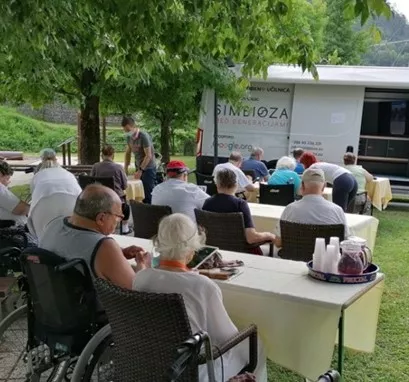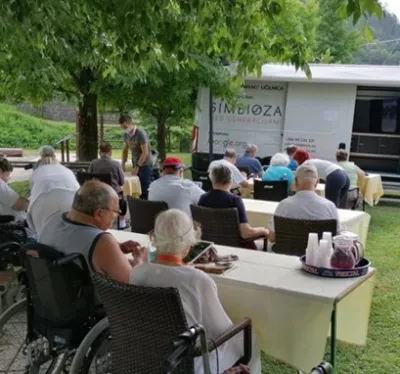Summary
Simbioza Mobiln@, a groundbreaking initiative in Slovenia, introduced a mobile classroom on wheels designed to impart knowledge of ICT tools and services to the elderly, especially those lacking access to conventional educational institutions in this field.
The project united various organisations within the Simbioza Community network, comprising 205 entities from all of Slovenia’s 12 statistical regions, including primary and secondary schools, elderly care facilities and NGOs.
Furthermore, it collaborated with numerous Slovenian organisations outside this network. From 2021 to 2022, the project successfully conducted more than 140 workshops with over 2 500 elderly participants and organised 120 physical activities involving 6 400 elderly individuals across the country; it also engaged 325 volunteers from the 12 different regions.
Results
Despite being launched during the turbulent period of the COVID-19 pandemic, Simbioza Mobiln@ achieved remarkable results. In just a year and a half, the project delivered 143 workshops, totalling 754 educational hours, to over 2 500 elderly participants. Additionally, 125 face-to-face activities for the elderly were conducted, amounting to 750 educational hours, which reached 6 412 elderly individuals across Slovenia.
The project’s activities involved 325 volunteers from across the country’s 12 statistical regions. Notably, the initiative contributed to the enhancement of the Magda mobile app, incorporating 30 new learning materials in the form of video guides and quizzes. Local coordinators conducted monitoring and evaluation using questionnaires tailored to the target group to assess their satisfaction levels.
Feedback was predominantly positive, with most elderly participants expressing interest in further training. Consequently, under the Simbioza Community framework, efforts to mobilise resources persist beyond the project, with robust support from young local volunteers who facilitate ICT workshops for the elderly in their communities. To help these volunteers, local coordinators provide non-formal training sessions, following a curriculum prepared by the Simbioza team.
Resources
Documents
Context
Slovenia has one of Europe’s most rapidly ageing populations. Despite having a well-developed digital infrastructure, only 55% of the Slovenian population aged between 16 and 74 possess basic digital skills and knowledge, a figure below the European average. Among the most vulnerable groups grappling with the digital transformation of society, particularly in rural areas, are the elderly.
Simbioza Mobiln@ offered a solution to bridge the gap between older generations and digitalisation. The initiative helped the elderly acquire ICT skills, empowering them to enjoy a better quality of life, greater independence, access to information and enhanced social inclusion.
Objectives
To guide and empower elderly people living in rural and remote areas to use ICT tools, enabling them to benefit from these tools and become more independent. This would also help them better connect with other individuals and access various services that are often harder to find in the areas where they reside.
Activities, key actors, and timeline
Ahead of the project, the Simbioza Community cooperated with 148 different organisations. This number increased to 232 by November 2023 and the organisations have continued to collaborate under this umbrella since the project’s completion. To achieve this, a strong networking and media campaign was conducted.
The main strategy relied on raising awareness about the positive effects of the project activities, especially showcasing concrete benefits for users, and continuously fostering a sense of community and common goals. Simbioza's staff and local volunteers conducted various on-site ICT workshops.
The vehicle used for the mobile classroom was equipped with interactive technologies in fields such as entertainment, communication, health and daily life and had its own mobile internet. This allowed elderly people without internet access to have their first contact with the internet and avoided connectivity issues during sessions. The objective was to provide the elderly with firsthand experience of new technologies through empirical, educational, informal and interactive methods to help them overcome their fear of using readily available technologies.
To ensure their participation, each organisation appointed a local coordinator with good knowledge of the local context. This was a key role for networking and engagement with residents in rural areas and for ensuring communication with the rest of Symbioza team.
Simbioza Mobiln@ introduced flexible learning methods in an innovative environment that supported the development of digital skills among the elderly. As well as the free ICT workshops, individual counselling and on-site assistance, an additional remote support service was available through Simbioza's ‘Magda’ app. This was the first mobile application for the elderly in Slovenia and included a classroom where various educational materials for independent self-learning and the acquisition of new digital skills were provided free of charge. The app had over 5 200 active users by 2023.
Success factors/Lessons learnt
The initiative highlights the significant role that NGOs play in responding promptly and effectively to two key challenges of the modern world – a longevity society and digital transformation. Initiated as a rapid response to the COVID-19 pandemic, this project illustrates the vital contribution that NGOs can make, even in unforeseen circumstances.
It was not without challenges, though. Key hurdles included addressing diverse needs among older individuals, encompassing various environments and levels of digital skills. Adapting the training approach proved essential, necessitating the development of flexible curricula tailored to different skills levels and needs. Building support involved mobilising local coordinators and volunteers to conduct workshops and ensuring sustained and effective participation.
Another significant challenge was securing long-term financial sustainability. In 2023, this social initiative was recognised by the Slovenian Ministry of Digital Transformation. Based on the results achieved by the mobile classroom, the ministry is implementing a project called Mobile Heroes, which involves multiple mobile units, including Simbioza Mobiln@, in providing digital competency training to the elderly, particularly in rural areas.
Contacts
Brigita Dane, brigita.dane@simbioza.eu

